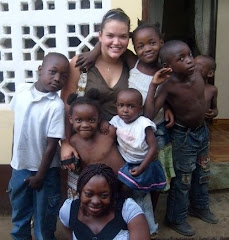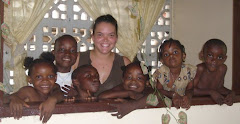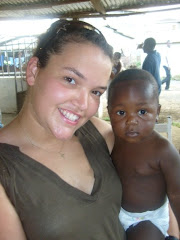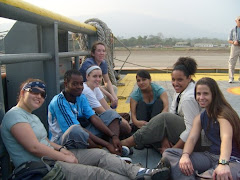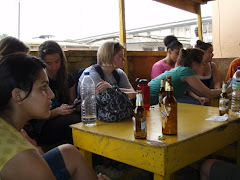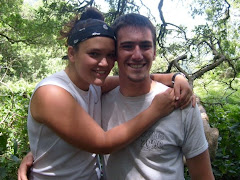I wanted to include a few photos of my time in EG before I get into the whole Peace Corps thing. The first is of Clinica Esperanza (the clinic where I volunteered for seven weeks).
 This is what the clinic looked like when you walked in the front door. To the immediate right was the check-in desk. The desk in the far right corner was the nurses desk, and to the left of that was an exam table. If you were to walk past the curtain in the middle of the picture and turn to the left, you would enter the lab. If you were to make a right past the curtain, you would enter a waiting area/immunization area.
This is what the clinic looked like when you walked in the front door. To the immediate right was the check-in desk. The desk in the far right corner was the nurses desk, and to the left of that was an exam table. If you were to walk past the curtain in the middle of the picture and turn to the left, you would enter the lab. If you were to make a right past the curtain, you would enter a waiting area/immunization area.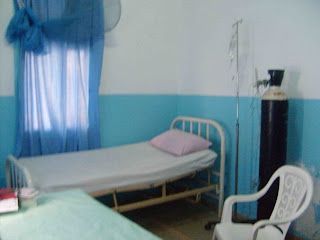 This is a picture of the only bed we had in the clinic. It also doubled as Dr. King's office. You can barely see his desk in the bottom left corner. This is where we would treat our malaria patients and do patient exams. For being in the capital city of Malabo, this was a great clinic. It had the basic necessities and the capability of performing many tests, even though most came in a box. The doctors were great and helped me learn a lot about tropical diseases.
This is a picture of the only bed we had in the clinic. It also doubled as Dr. King's office. You can barely see his desk in the bottom left corner. This is where we would treat our malaria patients and do patient exams. For being in the capital city of Malabo, this was a great clinic. It had the basic necessities and the capability of performing many tests, even though most came in a box. The doctors were great and helped me learn a lot about tropical diseases. This is UNGE (Universidad Nacional de Guinea Ecuatorial) where I spent 7 weeks studying. I took four classes while I was abroad but only three were taught here: Society and the Environment, Natural Resource Economics, and West African History and Culture. The last course, Field Research in Tropical Ecology, was taught in the village of Moka. There we conducted our own research and were taught by Dr. Tom Butynski.
This is UNGE (Universidad Nacional de Guinea Ecuatorial) where I spent 7 weeks studying. I took four classes while I was abroad but only three were taught here: Society and the Environment, Natural Resource Economics, and West African History and Culture. The last course, Field Research in Tropical Ecology, was taught in the village of Moka. There we conducted our own research and were taught by Dr. Tom Butynski.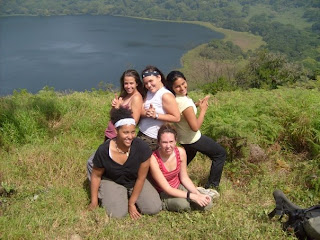 This is a picture of the girls and I at a place called Lago Biao (also known as Crater Lake). It is a few hour hikes from Moka and it is a sacred place to Equatoguineans. It was so beautiful! We hiked all the way down the hill to the lake and the boys even swam in it.
This is a picture of the girls and I at a place called Lago Biao (also known as Crater Lake). It is a few hour hikes from Moka and it is a sacred place to Equatoguineans. It was so beautiful! We hiked all the way down the hill to the lake and the boys even swam in it. This is a picture of my living accommodations for a month and a half. We slept in tents, bathed out of buckets or a lagoon, and did our wash in a freshwater stream. This picture happened to be taken on the Annual Caldera Expedition where we conducted monkey census for two weeks. We did a lot of hiking over those two weeks.
This is a picture of my living accommodations for a month and a half. We slept in tents, bathed out of buckets or a lagoon, and did our wash in a freshwater stream. This picture happened to be taken on the Annual Caldera Expedition where we conducted monkey census for two weeks. We did a lot of hiking over those two weeks. This was my main hike group. We were together over a two day hike. First we left in the afternoon and went on a three hour hike to Camp Peter. There we set up the tents and had dinner. The next day we got up really early and hiked all day long (at least 8 hours) up to Camp Hormiga. Camp Hormiga is at the top of the caldera and there are different population levels of monkey species up there than at the beach. I should mention that there are seven species of monkeys and all have dangerously low population levels. In addition, these species of monkey are endemic to the island, meaning that you can't find these specific subspecies anywhere else in the world! In the EG culture, eating monkey meat was considered normal. It is referred to as bushmeat. But with the extremely low population levels of monkey species, the president outlawed the killing of monkeys for consumption in October of 2007. Of course, a black market popped up for bushmeat, but the population levels have began to rise (thankfully).
This was my main hike group. We were together over a two day hike. First we left in the afternoon and went on a three hour hike to Camp Peter. There we set up the tents and had dinner. The next day we got up really early and hiked all day long (at least 8 hours) up to Camp Hormiga. Camp Hormiga is at the top of the caldera and there are different population levels of monkey species up there than at the beach. I should mention that there are seven species of monkeys and all have dangerously low population levels. In addition, these species of monkey are endemic to the island, meaning that you can't find these specific subspecies anywhere else in the world! In the EG culture, eating monkey meat was considered normal. It is referred to as bushmeat. But with the extremely low population levels of monkey species, the president outlawed the killing of monkeys for consumption in October of 2007. Of course, a black market popped up for bushmeat, but the population levels have began to rise (thankfully).Well now that you saw a small bit of what I experienced in EG, maybe you can understand my motivation for applying to the Peace Corps. I expected an in depth application, an interview, and a medical check-up... but what I didn't anticipate was the time it would take to finally be placed and leave! It's been over a year since I sent in my application (which was an ordeal by itself) and I still haven't received my placement even though I am scheduled to leave in January.
The basic outline for the application process seems pretty simple. First you submit an application online, then an interview, followed by a nomination. A nomination is meant to just give you an idea of where you will be going, when you will be leaving, and what you will be doing. It is always subject to change though. You are then sent a medical packet that is comprised of a physical exam, an eye exam, and an extremely thorough dental exam. If you are then medically cleared, you must then by financially and legally cleared as well. If all of that goes well, then you receive your invitation which includes you placement information. This is the step that I am at now, waiting for my invitation.
The application itself was about 15 pages long and included 2 essays and at least 3 references. Much thanks to Dr. Richard, Veronica Irvine, and Drew Cronin for taking the time to fill out the reference forms! The Peace Corps wanted to know everything about me and my family: parents schooling and occupations, my schooling, volunteer experience, etc. So... after that was completed, next was the interview.
The interview wasn't half as bad as I thought it would be. My recruiter was located in Penn State so I stopped by for my interview on the way back to school from spring break. I felt confident after the interview and a month or so after it, I was nominated for a healthcare program in Africa that would leave in January of 2010. I had made it very clear in my interview that I only wanted to go to Africa and work in the healthcare field. By doing this, I can gain patient care hours for Physician's Assistant school applications (which I plan on attending after my return from the Peace Corps).
When the medical packet came, I was not expecting the time it would take to complete it. It had an in depth physical with my PCP (which included several blood tests, a detailed history, and a record of all of my immunizations), an eye appointment and a dental check-up that felt like it would never end. The one good thing is that the Peace Corps provides some money to help pay for your appointments. I was able to use the money for my copay's.
After I sent in my medical packet, I got a follow-up medical packet and had to go back to the doctors office for additional tests. The entire medical packet took about 4 months to complete.
Just a few months ago, I was contacted by a new recruiter who was passed on my application, asking for an updated resume and final transcript. I guess they wanted to make sure that I actually graduated and wanted to see if I had continued to volunteer throughout my senior year at school. Since then, I haven't heard anything. I have been waiting such a long time to hear when I am leaving and what country I am going to. Last Thursday I called the Peace Corps and they told me that my recruiter has just started to place her candidates so I should be hearing soon. As soon as I know I will post it here. Until then, all I can do it wait.
